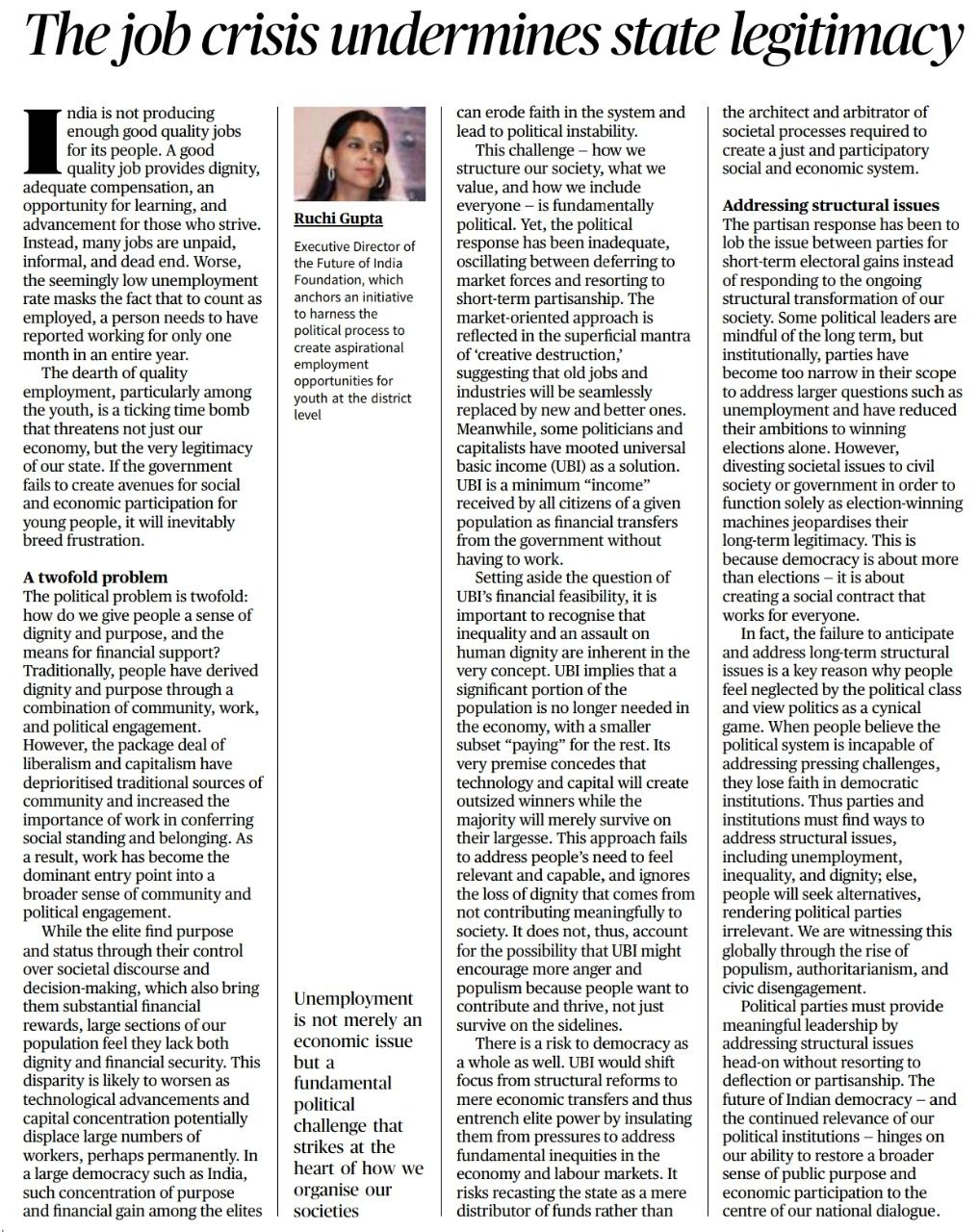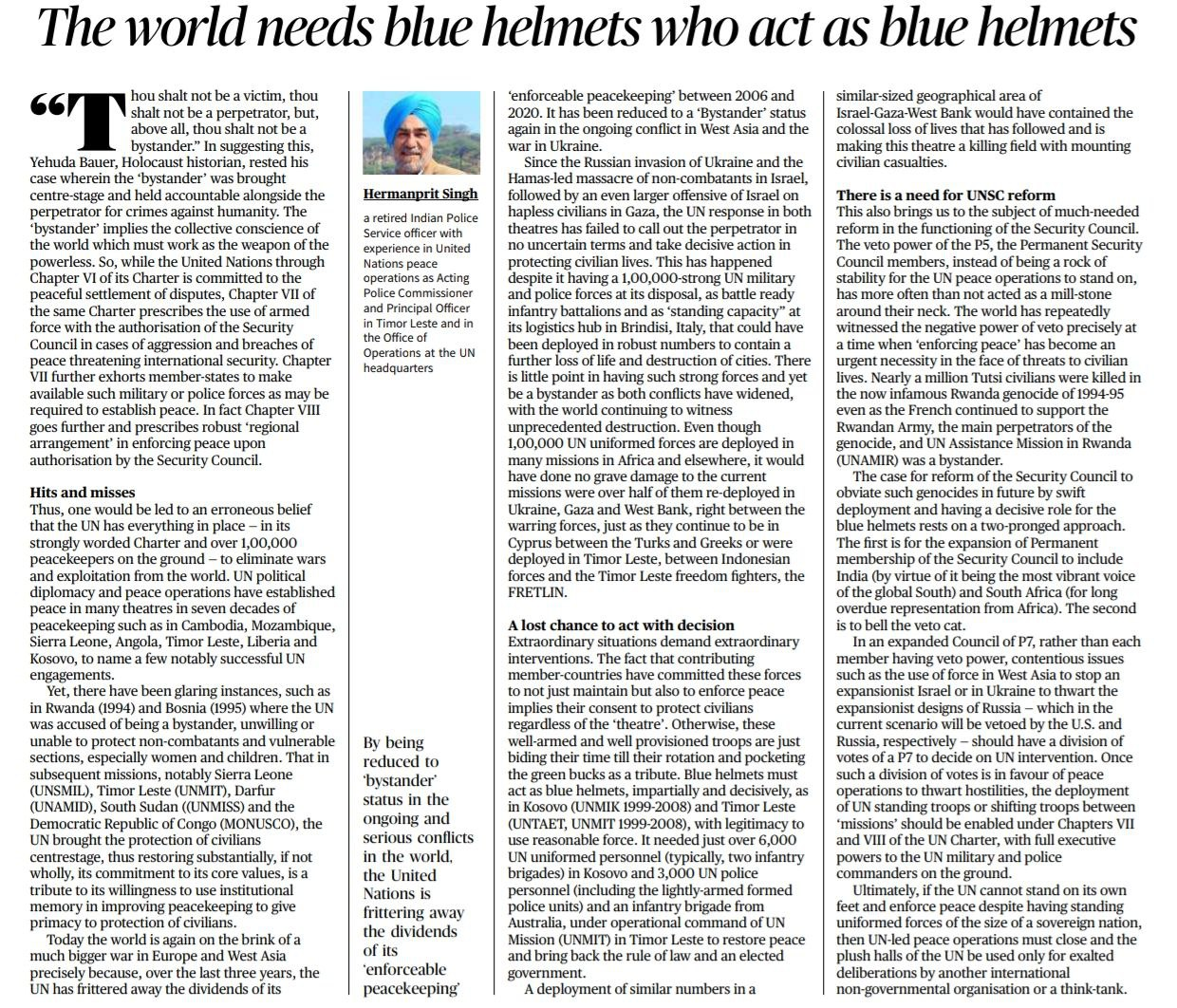1. The Job Crisis and its Impact on State Legitimacy
Introduction:
India faces a significant employment crisis, marked by the lack of quality jobs that provide not just financial stability but also dignity and purpose.
The issue of unemployment, particularly among the youth, poses serious challenges to the legitimacy of the state. A failure to address this crisis could lead to political instability and societal discord, highlighting the urgent need for structural reforms in the socio-economic system.
The Nature of the Job Crisis:
- Quality over Quantity:
While official unemployment figures may seem low, the real issue is the dearth of quality employment. Many of the available jobs are informal, unproductive, or simply “dead-end” jobs that do not offer opportunities for growth or advancement. - Impact on Youth:
The lack of meaningful employment is especially detrimental to the youth, for whom this crisis is a ticking time bomb. Without the ability to contribute productively to society, their frustration could lead to social unrest. - State Legitimacy at Risk:
Unemployment does not merely affect the economy; it erodes public trust in the state’s ability to serve as an arbiter of societal processes. The failure to provide jobs could eventually undermine the legitimacy of the government and institutions.
Root Causes of the Crisis:
- Shift in Value Systems:
Historically, dignity and purpose were tied to community, work, and political engagement. However, the rise of liberalism and capitalism has led to a devaluation of traditional sources of meaning and a shift towards the market-oriented approach. - Economic Disparity:
Technological advancements and capital concentration have displaced large numbers of workers, exacerbating economic inequality. This disparity creates alienation and a sense of purposelessness among the masses.
Addressing the Crisis:
- Inadequate Political Response:
The state’s approach has oscillated between deference to market forces and short-term electoral gains, failing to address the structural transformations required to tackle the problem. - Universal Basic Income (UBI):
Some political leaders propose Universal Basic Income as a solution to the crisis. However, UBI’s promise of a minimum income for all without the requirement to work may worsen inequality by creating a system where technology and capital generate wealth for a few, while the majority are left out. - Need for Structural Reforms:
The core issue lies in redesigning societal structures that define dignity, purpose, and economic participation. Political parties and institutions must address fundamental inequities in the economy and labor markets by fostering inclusive growth and sustainable job creation.
Conclusion:
The job crisis in India is not just an economic problem but a fundamental political challenge. It strikes at the heart of how societies are organized and reflects deeper structural flaws in the system.
Political leadership must rise above short-termism and partisanship to enact meaningful reforms that tackle unemployment, inequality, and social dignity.
Failure to do so risks eroding the legitimacy of the state and democratic institutions, potentially leading to widespread discontent and political instability.
Mains Practice Question: |
Q. “Unemployment is not merely an economic challenge but a fundamental political issue that impacts the legitimacy of the state.” Discuss the statement in light of the current job crisis in India, along with potential solutions to address the issue.
|
2. The Role of the United Nations Peacekeeping Forces and the Urgent Need for Security Council Reform
Introduction:
The United Nations (UN) was created with a vision of preventing wars and ensuring global peace. Through its peacekeeping forces, often referred to as “Blue Helmets,” and diplomatic efforts, it has had some success in stabilizing regions.
However, recent conflicts, notably in Ukraine and Gaza, have raised serious questions about the UN’s capacity to act decisively. This article examines the UN’s current state, the impact of its peacekeeping missions, and the urgent need for reform, especially regarding the Security Council.
UN Peacekeeping Mandate:
- Charter Framework:
The UN operates through Chapter VI (peaceful resolution of disputes) and Chapter VII (authorizing armed force when necessary). Over the decades, the organization has deployed over 100,000 peacekeepers in conflict zones across the world. - Success Stories:
The UN has had notable successes in peace operations, including missions in Cambodia, Mozambique, Sierra Leone, and Timor Leste. These missions have helped restore stability and protect civilians in fragile states.
Failures of the UN:
- Rwanda and Bosnia:
The failures in Rwanda (1994) and Bosnia (1995) exposed the limitations of the UN. In both cases, the UN peacekeepers were accused of inaction and failure to protect civilians during genocides, leading to widespread criticism. - Recent Inaction:
The ongoing conflicts in Ukraine and Gaza highlight the UN’s inability to intervene effectively. Despite having significant military and police forces, the UN has been reduced to a “bystander” in these critical regions, unable to protect civilians or prevent escalating violence.
Reforming the Security Council:
- The Veto Power Problem:
The Permanent Five (P5) members of the UN Security Council wield veto power, which often blocks effective intervention. This veto system has been used to prevent actions in major conflicts, such as Russia’s invasion of Ukraine and Israel’s offensive in Gaza. The veto has turned from a tool of stability into a hindrance for peacekeeping. - Expanding Permanent Membership:
To reform the Security Council, there is a strong case for including new permanent members such as India and South Africa, representing the global South and Africa. Expanding the council would provide more equitable representation in global decision-making. - Limiting Veto Use:
In an expanded P7, veto power should not be absolute. Contentious decisions, especially involving civilian protection or humanitarian crises, should be determined through majority voting rather than being blocked by a single country’s veto.
The Role of Blue Helmets:
- Enforceable Peacekeeping:
For peacekeepers to act effectively, they must have the mandate to enforce peace when needed. The UN has previously shown that small contingents of peacekeepers, such as those in Kosovo and Timor Leste, can stabilize regions. - Need for Immediate Action:
Extraordinary situations require immediate and decisive action. The deployment of 6,000-10,000 troops in conflict zones like Gaza, Ukraine, or West Asia could prevent further escalation and protect vulnerable civilians.
Conclusion:
The UN’s peacekeeping missions are vital for maintaining global peace, but their effectiveness is hampered by the veto system and lack of decisive action.
Reforming the Security Council and empowering Blue Helmets to act decisively, without political interference, is essential for restoring the UN’s credibility. The organization must rise to the challenges of modern conflicts, or risk becoming irrelevant in the face of growing global instability.
Mains Practice Question: |
Q. “Reform of the UN Security Council is necessary to make the United Nations more effective in maintaining global peace.” Critically examine the statement, highlighting the role of the veto power and the effectiveness of UN peacekeeping missions.
|



